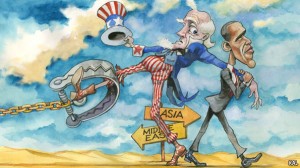 By Donald Kirk, East-Asia-Intel.com
By Donald Kirk, East-Asia-Intel.com
WASHINGTON — The debate is so familiar.
Should the United States plunge into a war in a region about which all too little is really understood? President Obama, having foresworn war, now is edging into a conflagration in Syria and Iraq that is sure to go on for years and may eventually bring about a new influx of U.S. ground troops whom Obama withdrew so triumphantly from Iraq.
Sure, Obama and Secretary of State John Kerry and Defense Secretary Chuck Hagel, playing with words, tell us it’s just a “counter-terror operation” and that they’re limiting the U.S. commitment to air strikes and a few people on the ground, special forces, forward observers, security guards, who knows? The point is you don’t win a war with air strikes alone.

That’s axiomatic. In the end the infantry goes in and takes the territory. That’s what eventually will happen if the U.S. — and whatever “coalition” the U.S. can piece together — have a prayer of wiping out ISIL, the Islamic State of Iraq and the Levant.
The U.S. isn’t about to acknowledge that reality for a couple of reasons. One is that Obama is so committed against war, so anti-war, that it’s really a reversal of his whole campaign propaganda for him to become a war-time president. Not that presidents haven’t reversed themselves plenty of times, but Obama’s predilection against war is at stake here. He doesn’t want to go out of office as a president who plunged the U.S. into a prolonged conflict that his successor will have to fight. On the other hand, he’d rather not go down as the peacenik president who was afraid to fight at all.
Yet another issue is that turning this counter-terror operation into a real war raises the whole issue of whether Congress has to authorize it. Obama has tried to get away with saying he doesn’t need congressional authorization for counter-terrorism against ISIL since George W. Bush during his presidency got away with that concession for combating Al Qaida. The argument now is that Al Qaida and ISIL are the same and the White House is free to go after the bad guys now as it was while Bush was around.
For one who spent years in Vietnam, the build-up to war in Syria and Iraq is dishearteningly familiar.
Memories of swarms of Americans trying to win the hearts and minds of the peasantry as hundreds of thousands of U.S. troops poured into South Vietnam from the Mekong River delta to the jungly central highlands to the phony “demilitarized zone” that divided North from South Vietnam at the 17th parallel all come to mind.
Listening to experts at a panel put on by the Center for American Progress in Washington is not exactly a confidence-raising experience. Robert Ford, the last American ambassador to Syria, suggested it wasn’t too hard to distinguish between good guys and bad guys while combating ISIL on one hand and the Barshar Assad regime on the other. When I asked him if the U.S. should return in force to Iraq, and Syria too, with tens of thousands of troops, he said that would be “terrible” — would guarantee “disaster”.
A report issued by the center says it’s still possible to tell good from bad guys and work with the former.
Not simple, says the report, but we have to go for it. “This summer’s events in Iraq and Syria were a wake-up call,” it tells us. ISIL’s “capture of territory and its vicious crimes against humanity prompted the Obama administration to take targeted military action in Iraq” — with “tangible results” — even if “they also raised questions about the next steps for U.S. policy in both Iraq and Syria.”
But to whom do you turn when “these ‘third way’ forces” – moderate alternatives to Assad and ISIL — “remain weak because they do not have organized and well-coordinated assistance.” The report offers a prescription: “Swifter U.S. action,” “stronger regional coordination,” “additional support to the opposition.” True, building a reliable “opposition” will “take time,” it warns, while jihadists remain “a long-term policy challenge.”
In the end, you can’t help but feel these experts have no idea where this struggle is headed. Going on 40 years since the defeat of the U.S.-backed Saigon regime, you see another war that’s very different but if anything longer lasting and more complicated than whatever it was we were doing in Vietnam.
While the debate rages on among the White House, Congress, the media and think tanks, no one gives a thought to Korea.
Oh, the White House says the U.S. is indeed making the “pivot” toward Asia — fortifying Asian defenses as promised — but that’s absurd. The U.S. now has a war to fight in the Middle East and the danger of war in Northeast Asia as well.
Perhaps “pendulum” rather than “pivot” would be a better word to describe the movement of U.S. planes and ships from the Middle East to Northeast Asia and back again.
Columnist Donald Kirk has been covering war and peace in Asia for decades. He’s at kirkdon@yahoo.com

You must be logged in to post a comment Login